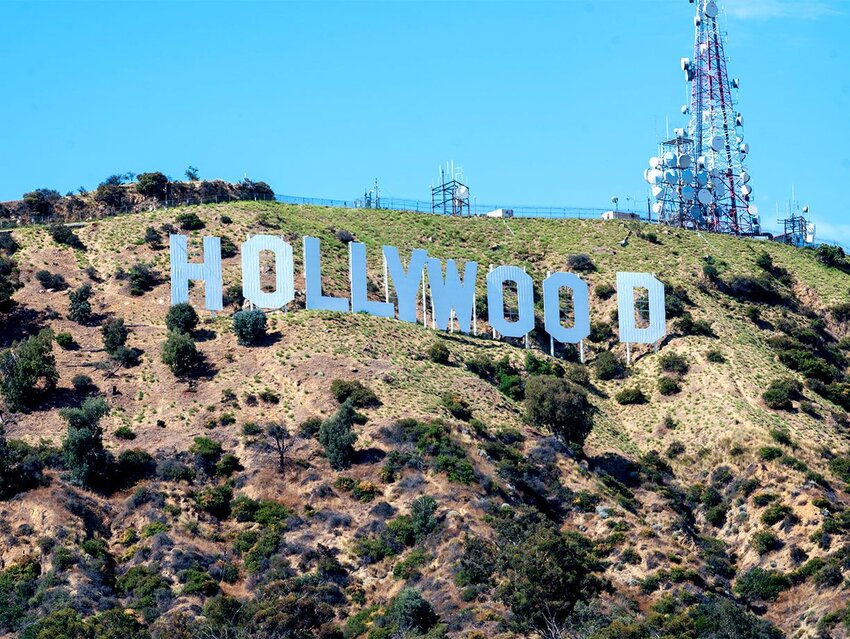We’re obsessed. For over a century, movies have dominated the popular imagination and helped defined modern culture. They can inspire fashion trends and even spark social change, so it’s no surprise that they also influence the way we communicate. Whether it's Darth Vader luring people to “the Dark Side” or Mean Girls trying to “make fetch happen,” Hollywood-born words find their way into our everyday vocabulary. Here are 9 terms that entered the lexicon through the big screen and changed language forever.
Paparazzi
Paparazzi are those persistent photographers who take pictures of celebrities trying to pick up their dry cleaning or get a cup of coffee. The word “paparazzi” comes from Italian auteur Federico Fellini's 1960 film La Dolce Vita. The character Paparazzo was a news photographer whose name was inspired by the annoying noise of a buzzing mosquito. Sounds about right.
Ginormous
A hilarious blend of the words “gigantic” and “enormous”— “ginormous” is a useful term to express that something is really, really, really big. This word owes much of its popularity to Buddy the Elf (Will Ferrell), protagonist of the 2003 Christmas comedy Elf. Though the term was used as far back as the 1940s, it was finally added to the dictionary in 2007. That makes us smile. And smiling’s our favorite.
Droid
A shortened form of “android,” a “droid” is a robot who looks and acts like a human being. The term has appeared in science fiction stories since the 1920s, but it was popularized by 1977’s Star Wars: Episode IV — A New Hope. Today, droids aren’t used outside of the Star Wars universe because they are a registered trademark of Lucasfilm. When Verizon Wireless wanted to launch a new smartphone — the Droid — it had to license the name from George Lucas. The force is strong with this one.
Perfect Storm
“The perfect storm” refers to a rare situation where an unusually bad combination of events makes everything worse. Though the phrase was used as early as the 1700s, the success of Sebastian Junger’s 1997 nonfiction bestseller The Perfect Storm — about a Nor’easter that hit the East Coast of the United States — and the 2000 movie that followed launched this idiom into popular culture.
Bombshell
Originally, a bombshell meant an artillery shell or a devastating event. But the word took on a new meaning in the 1930s — a stunningly gorgeous woman. The term was popularized when iconic blonde beauty Jean Harlow (a precursor to Marilyn Monroe) starred in the 1933 film Bombshell.
Bye, Felicia
This farewell isn’t only for those with the specific name. When someone’s leaving and you’re glad to see them go, toss a “Bye Felicia” their way. You’re so over them. This dismissive send-off first appeared in the 1995 film Friday — in which protagonist Craig (Ice Cube) dismisses an obnoxious neighbor named Felicia — and it gained wider cultural appeal after being used on RuPaul’s Drag Race in 2009.
Catfish
This slang term for creating a fake persona online to defraud or manipulate someone comes from the 2010 documentary Catfish, which is about a man who corresponds with a woman who is not who she says. In the film, someone tells a story about adding catfish to shipments of live cod to keep the fish active. In this metaphor, a person online pretending to be someone else is like a catfish keeping the lives of the docile cod interesting. There’s really no relation between the real catfish and a fake persona, but this term is still gaining in popularity as dating apps and social media at large make such deception all too easy. (Catfish also spawned a popular MTV reality show of the same name, documenting one “catfish” situation after another.)
Hoverboard
In 1989’s Back to the Future II, Marty McFly (Michael J. Fox) rides a hoverboard, which is essentially a skateboard that levitates a few inches off the ground. Great Scott! This floating transportation was first described in science fiction stories dating back to the 1960s. Since then, many inventors have tried to make real-life hoverboards, but no one has succeeded so far. Today, you can buy a non-flying hoverboard, also called a self-balancing scooter. Just don’t try to hit 88 miles an hour with it.
Godfather
Since the 12th century, a godfather has been a man who sponsors a baptism in the Christian church. Mario Puzo’s novel The Godfather and the classic 1972 film that followed changed the word's meaning. Today, when we think of a Godfather, we might also imagine Don Corleone (Marlon Brando) — a mafia kingpin making an offer we can’t refuse.
Featured image credit: RB/Bauer-Griffin/ Contributor/ Getty Images

